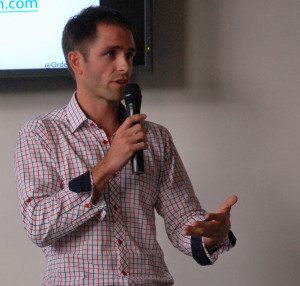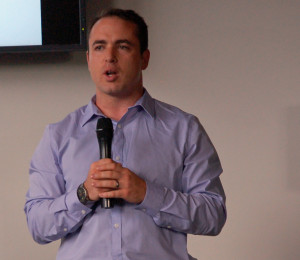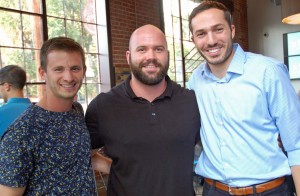DENVER, CO – Last Thursday night, the café at Galvanize’s Golden Triangle campus was packed with an informal gathering of tech entrepreneurs and enthusiasts who had come to the co-working space for Pitchers & Pitches, Galvanize’s monthly pitch contest for local startups. Most of the attendees stood near the front of the café, chatting with one another as they drank craft beers from the bar, unaware that this month’s pitch contest would be different from those that had come before it.
A table had been set up near the back of the café for the presenters to set their laptops on. Each would be allowed three minutes to pitch, and then two minutes to field questions from a panel of judges. The three judges on the panel had each been drawn from local companies, and were prepared to use their business expertise to vet the pitches they would hear that evening.
Yet this Pitchers & Pitches would be unlike previous ones. As the audience would soon discover, three of the six companies chosen to present were digital health startups. The burgeoning Colorado digital health movement had come to Galvanize to make itself known, much to the surprise of everyone present.
Fledging Startup Orderly Health Is Already Flapping Its Wings

Co-founder of Orderly Health Kevin Krauth responds to the judges’ questions at the end of his pitch.
Kevin Krauth, the charming and knowledgeable co-founder of Orderly Health, represented the first digital health company to take the stage at last Thursday’s Pitchers & Pitches. His swiftly delivered presentation gave the gathering of startup entrepreneurs and enthusiasts a comprehensive sense of his company’s vast scope and ambition.
“How many of you guys know to the dollar how much you spent in total on healthcare last year,” Kevin asked the crowd. “You also have to remember to include premiums, out-of-pocket expenses, after-tax contributions to your HSA or FSA, acupuncture, chiropractic, prescriptions, over-the-counter medicine – everything.”
“Any hands?” Kevin looked around at the quiet audience members, who appeared to have been silenced by the deluge of considerations that one had to take into account when budgeting for healthcare in America. “No one?”
“This is a problem, because if you don’t know how much you’re spending on healthcare, then you have no idea how to keep your costs down, and you have no idea how to manage those costs.”
“Orderly helps to bridge this gap,” Krauth said, depicting his product as a means of reducing those excessive healthcare costs. “For consumers, Orderly provides a powerful platform to manage your expenses. You start by linking any account where you spend money on healthcare. Orderly will pull all of your spending data and organize it into an intuitive dashboard. We then analyze this data to offer you personalized insights into how to get the most out of your healthcare.”
According to Krauth, the market for healthcare analytics will grow to over 20 billion dollars by 2020. Orderly Health aims to take a segment of that market by targeting high-frequency users of the healthcare system, along with the 15.5 million Americans who have high-deductible insurance plans.
“By signing up for Orderly, you receive an amazing free service that helps you save money irrespective of your insurance company or your employer. We then anonymize and aggregate data into a secure database that can be used by benefits brokers or care organizations to better stratify risk, predict cost, or design coverage plans that are more responsive to members like you.”
Before founding Orderly Health, Krauth had worked at EA Sports, where he had assisted in the creation of data analytics projects for the entire organization. His co-founder, James Dickhoner, was an MD who had recently completed a program in entrepreneurship at Stanford University. In the short time that they’d been working together, the duo’s admirable drive and keen understanding of their market had already attracted the attention of potential consumers and partners.
“We’ve only been working on this full-time for about two months,” Krauth admitted, “and we’re already seeing some incredible progress.” He went on to list Orderly’s accomplishments to date, which included requesting data from four of the six major payers, getting over a hundred people to sign up for Orderly Health’s alpha product, and negotiating a paid pilot with a local self-insured employer.
“Actually, just a few hours ago” Krauth said as he neared the end of his pitch, “we found out that we’re moving on in the interview process for getting into Techstars as well.” By the time he had finished his presentation, it was clear to everyone in the audience that this young company was ready to fly.
The Veteran Paramedics Who Are Building the Future of EMS

Co-founder of Novum Concepts Mike Kobneck details his years of paramedic experience to the crowd at Galvanize’s Pitchers & Pitches.
Mike Kobneck, co-founder of Novum Concepts and a veteran paramedic with over ten years of ambulance experience, provided the audience at Galvanize with their second digital health pitch of the evening. Along with his co-founder and fellow paramedic Kevin Scardina, Kobneck had run almost ten thousand emergency calls for the City and County of Denver.
“One of the things I noticed on all of those calls was that getting good quality data from the field to the hospital was always very challenging.” Kobneck’s practical, no-nonsense way of framing the problem that his company was trying to address reflected the down-to-earth attitude of an experienced emergency responder.
“Often there’s a lot of stuff that’s going on. If you’re doing CPR or if there’s somebody who’s been shot multiple times, this can lead to poor communication from the field.” He described the issues that might arise due to communication difficulties between emergency responders and the hospital, including an inability for the hospital to properly prepare to receive the patient, which in many cases could lead to delays in care.
“So I turned to one of my paramedic friends and I said, ‘What do you think we can do about this?” Inspired by the saying, “A picture is worth a thousand words,” Kobneck and Scardina set to work developing their signature product, Biophone.
“Biophone takes images and video from the field, and it encodes them with end-to-end encryption that’s HIPPA compliant. It sends that to the hospital, which is then able to look at the images and videos on an iPad.”
According to Kobneck, Biophone is currently being used in Good Samaritan Hospital in Lafayette, Colorado. Four transporting agencies are also using the app, including Mountain View Fire, Louisville Fire, Lafayette Fire, and Rocky Mountain Fire. After revealing that Novum Concepts was currently attempting a county-wide push in Boulder, Kobneck also mentioned that his company was in early discussions with AMR, the largest ambulance service in the nation.
“The way that we’re being used at Good Samaritan is for registration purposes only, to get rid of that bottle-neck,” Kobneck admitted, before explaining how critical the ten minutes saved by pre-registering a patient with Biophone could be in an emergency situation.
Regarding its revenue model, Novum Concepts charges hospitals a flat fee for the month, which pays for its servers. Then the company charges its clients a per message fee. “So if you’re a hospital that gets 500 monthly patients, you’re charged less than a hospital with 2,000 monthly patients.”
Kobneck finished his pitch by sharing the story of Biophone’s development. “My partner Kevin has previous coding experience. He worked in Silicon Valley during the late 90s and early 2000s. We built Biophone while we were on the ambulance. We had no outside funding whatsoever. We built it on the nights and weekends around our shifts.”
Kobneck gave the crowd at Galvanize a look of mild exhaustion, which might have been genuine, given that he had just spent the last five hours at the product-pitch boot-camp that Prime Health had held for its 2015 Digital Health Challenge semi-finalists.
“Yeah, it was pretty rough,” he admitted with a slight grin, to the general amusement of his audience. That a paramedic who had responded to emergencies of all kinds, from T-boned cars to drive-by shootings, would acknowledge the daily struggle that every tech entrepreneur knew only too well, was yet another testament to the camaraderie and determination of the Colorado digital health community.
Lifestyle Social’s Wellness Platform Wants to Transform Personal Training

The founders of Lifestyle Social spoke with CyberMed News after presenting at this month’s Pitchers & Pitches.
The third and final digital health company to pitch their product at Galvanize last Thursday was Lifestyle Social, whose flagship wellness platform was intended to help personal trainers better coach their clients. Matt Lowe, one of the founders of Lifestyle Social, delivered his pitch with the affable intensity of an accomplished personal trainer, so it was no surprise when his audience learned that he had over twenty years of experience as a wellness professional.
“The fitness status quo in American is not working,” Lowe declared at the start of his presentation. “Over 75% of the US population is now overweight or obese. And wellness professionals know that 75% of success in healthy living is proper nutrition alone.”
Lowe faulted the personal training industry for its slow adoption of fitness technology. “Cardio and strength training is now Wi-Fi and Bluetooth enabled. Wearables can count sets and repetitions. However, this is causing another level of complexity for the consumer. Numbers alone don’t produce results. Numbers and knowledge do.”
Claiming that tech-savvy trainers would play a necessary role in addressing the obesity pandemic, Lowe emphasized that the major obstacle to empowering these trainers was figuring out how to aggregate and analyze the data that they gathered during training sessions. “Wellness pros still use antiquated, one-dimensional systems,” he said. “You can walk into any club or rec center and they’re still using paper and pencil methods for tracking their clients’ personal training, with little or no nutritional direction.”
It was for this reason that Lifestyle Social had developed its platform. “We built a dashboard that’s an intelligent virtual assistant for wellness professionals. It’s a web-based software solution to help increase program engagement as well as client success by combining multiple elements into one easy to use dashboard.”
According to Lowe, the Lifestyle Social wellness platform includes an education portal so that trainers can provide their clients with appropriate information regarding their specific regimens. The portal’s educational materials are drawn from a database that Lifestyle Social developed in partnership with Stanford University and the University of Tampa.
Lowe went on to describe the customizable nature of the platform, which had a drag-and-drop interface that allowed for individualized workouts, and adjustable meal plans that could be built according to the resting metabolic rate of a client. “All of this allows trainers to focus more on service, and less on the science of training.”
In closing, Lowe revealed that in the three weeks since Lifestyle Social had launched its platform, they had already received inquiries from hospitals and corporate wellness programs, including the national giant GlobalFit.
“Lifestyle Social is dedicated to making the world a healthier place,” Lowe affirmed in the seconds before his time was up, “one trainer at a time.”
A Booming Community Finds Its Voice
An app designed to help you manage your healthcare spending. Another intended to improve communication between ambulances and the ER. And a wellness platform that will enable personal trainers to better serve their clients. Each product represented the drive, ambition, and entrepreneurial spirit so characteristic of the Colorado digital health movement; and as each digital health company took the stage at this month’s Pitchers & Pitches, it became apparent to all present that the booming Colorado digital health community had found its voice.
Like the coverage that CyberMed News provides? Follow us on Twitter, LinkedIn, and Facebook to make sure you keep up to date on the most recent developments in Colorado’s digital health community.





Be the first to comment on "Colorado Digital Health Companies Crowd the Stage at Galvanize’s Pitchers & Pitches"